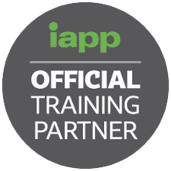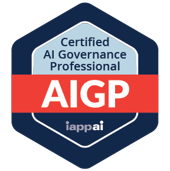Certified AI Governance Professional (AIGP)
Book online today or, if you need help choosing the right course or would like to discuss business discounts, call us on 0113 220 7150.
Virtual
From £1,635 +VAT
Overview
The Artificial Intelligence Governance Professional training or 'AIGP' teaches professionals how to develop, integrate and deploy trustworthy AI systems in line with emerging laws and policies around the world. The course and certification provide an overview of AI technology, survey of current law and strategies for risk management, among many other relevant topics.
Why should I take the Certified Artificial Intelligence Governance Professional training?
Businesses and institutions need professionals who can evaluate AI, curate standards that apply to their enterprises, and implement strategies for complying with applicable laws and regulations.
With the expansion of AI technology, there is a need for professionals in all industries to understand and execute responsible AI governance. The AIGP credential demonstrates that an individual can ensure safety and trust in the development and deployment of ethical AI and ongoing management of AI systems.
What's included:
- Official learning materials
- Exam Voucher (when available from the IAPP in Q1 2024)
- 1st Year -IAPP Membership
Prerequisites
There are no prerequisites for this course.
Who Should Train?
We must continue to build and refine the governance processes through which trustworthy AI will emerge and we must invest in the people who will build ethical and responsible AI. Those who work in compliance, privacy, security, risk management, legal, HR and governance together with data scientists, AI project managers, business analysts, AI product owners, model ops teams and others must be prepared to tackle the expanded equities at issue in AI governance.
Including any professionals tasked with developing AI governance and risk management in their operations, and anyone pursuing IAPP Artificial Intelligence Governance Professional (AIGP) certification.
Delegates will learn how to
AIGP training teaches how to develop, integrate, and deploy trustworthy AI systems in line with emerging laws and policies. The curriculum provides an overview of AI technology, survey of current law, and strategies for risk management, security and safety considerations, privacy protection and other topics.
- Establish foundational knowledge of AI systems and their use cases, the impacts of AI, and comprehension of responsible AI principles.
- Demonstrate an understanding of how current and emerging laws apply to AI systems, and how major frameworks are capable of being responsibly governed.
- Show comprehension of the AI life cycle, the context in which AI risks are managed, and the implementation of responsible AI governance.
- Presents awareness of unforeseen concerns with AI and knowledge of debated issues surrounding AI governance.
This training teaches critical AI governance concepts that are also integral to the AIGP certification exam. While not purely a “test prep” course, this training is appropriate for professionals who plan to certify, as well as for those who want to deepen their AI governance knowledge. Both the training and the exam are based on the same body of knowledge.
Outline
Module 1: Foundations of artificial intelligence
Defines AI and machine learning, presents an overview of the different types of AI systems and their use cases, and positions AI models in the broader socio-cultural context.
- Understand the differences among types of AI systems.
- Understand the AI technology stack.
- Understand AI and the evolution of data science.
Module 2: AI impacts on people and responsible AI principles
Outlines the core risks and harms posed by AI systems, the characteristics of trustworthy AI systems, and the principles essential to responsible and ethical AI.
- Understand the core risks and harms posed by AI systems.
- Understand the characteristics of trustworthy AI systems.
Module 3: AI development life cycle
Describes the AI development life cycle and the broad context in which AI risks are managed.
- Understand the similarities and differences among existing and emerging ethical guidance on AI.
- Understand the existing laws that interact with AI use.
- Understanding key GDPR intersections.
- Understanding liability reform.
Module 4: Implementing responsible AI governance and risk management
Explains how major AI stakeholders collaborate in a layered approach to manage AI risks while acknowledging AI systems’ potential societal benefits.
- Understanding the requirements of the EU AI Act.
- Understand other emerging global laws.
- Understand the similarities and differences among the major risk management frameworks and standards.
Module 5: Implementing AI projects and systems
Outlines mapping, planning and scoping AI projects, testing and validating AI systems during development, and managing and monitoring AI systems after deployment.
- Understand the key steps in the AI system planning phase.
- Understand the key steps in the AI system design phase.
- Understand the key steps in the AI system development phase.
- Understand the key steps in the AI system implementation phase.
Module 6: Current laws that apply to AI systems
Surveys the existing laws that govern the use of AI, outlines key GDPR intersections, and provides awareness of liability reform.
- Ensure interoperability of AI risk management with other operational risk strategies
- Integrate AI governance principles into the company.
- Establish an AI governance infrastructure.
- Map, plan and scope the AI project.
- Test and validate the AI system during development.
- Manage and monitor AI systems after deployment.
Module 7: Existing and emerging AI laws and standards
Describes global AI-specific laws and the major frameworks and standards that exemplify how AI systems can be responsibly governed.
- Awareness of legal issues.
- Awareness of user concerns.
- Awareness of AI auditing and accountability issues.
Module 8: Ongoing AI issues and concerns
Presents current discussions and ideas about AI governance, including awareness of legal issues, user concerns, and AI auditing and accountability issues.


Special Notices
QA is proud to be an official IAPP partner, authorised to deliver the AIGP course.
Read Richard Beck's blog on ensuring AI safety.
Related courses
QACIPP
Virtual/Classroom
Certified Information Privacy Professional
QACIPT
Virtual/Classroom
Certified Information Privacy Technologist
QACIPM
Virtual/Classroom
Certified Information Privacy Manager
QAAISECF
Virtual
AI Fundamentals for Security Professionals
QAAIBE
Virtual/Classroom
AI Business Essentials
QACGDPRP
Virtual/Classroom
Certified Data Protection Foundation and Practitioner
QAAIBCSE
Virtual/Classroom
BCS Essential Certificate in Artificial Intelligence (AI)
Cyber Security learning paths
Want to boost your career in cyber security? Click on the roles below to see QA's learning pathways, specially designed to give you the skills to succeed.
 = Required
= Required
 = Certification
= Certification











Privacy Professional learning path
Want to boost your career as a Privacy Professional? View QA's learning pathway below, specially designed to give you the skills to succeed.
 = Required
= Required
 = Certification
= Certification




Emerging Tech Security learning paths
Want to boost your career in Emerging Tech Security? View QA's learning pathway below, specially designed to give you the skills to succeed.
 = Required
= Required
 = Certification
= Certification
Frequently asked questions
See all of our FAQsHow can I create an account on myQA.com?
There are a number of ways to create an account. If you are a self-funder, simply select the "Create account" option on the login page.
If you have been booked onto a course by your company, you will receive a confirmation email. From this email, select "Sign into myQA" and you will be taken to the "Create account" page. Complete all of the details and select "Create account".
If you have the booking number you can also go here and select the "I have a booking number" option. Enter the booking reference and your surname. If the details match, you will be taken to the "Create account" page from where you can enter your details and confirm your account.
Find more answers to frequently asked questions in our FAQs: Bookings & Cancellations page.
How do QA’s virtual classroom courses work?
Our virtual classroom courses allow you to access award-winning classroom training, without leaving your home or office. Our learning professionals are specially trained on how to interact with remote attendees and our remote labs ensure all participants can take part in hands-on exercises wherever they are.
We use the WebEx video conferencing platform by Cisco. Before you book, check that you meet the WebEx system requirements and run a test meeting (more details in the link below) to ensure the software is compatible with your firewall settings. If it doesn’t work, try adjusting your settings or contact your IT department about permitting the website.
Learn more about our Virtual Classrooms.
How do QA’s online courses work?
QA online courses, also commonly known as distance learning courses or elearning courses, take the form of interactive software designed for individual learning, but you will also have access to full support from our subject-matter experts for the duration of your course. When you book a QA online learning course you will receive immediate access to it through our e-learning platform and you can start to learn straight away, from any compatible device. Access to the online learning platform is valid for one year from the booking date.
All courses are built around case studies and presented in an engaging format, which includes storytelling elements, video, audio and humour. Every case study is supported by sample documents and a collection of Knowledge Nuggets that provide more in-depth detail on the wider processes.
Learn more about QA’s online courses.
When will I receive my joining instructions?
Joining instructions for QA courses are sent two weeks prior to the course start date, or immediately if the booking is confirmed within this timeframe. For course bookings made via QA but delivered by a third-party supplier, joining instructions are sent to attendees prior to the training course, but timescales vary depending on each supplier’s terms. Read more FAQs.
When will I receive my certificate?
Certificates of Achievement are issued at the end the course, either as a hard copy or via email. Read more here.
